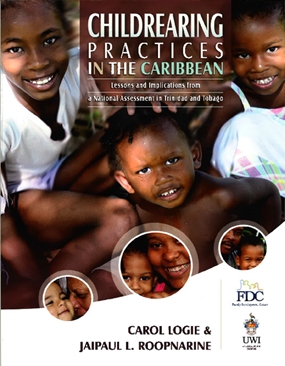New publication for practitioners in the fields of child and family development: “Childrearing Practices in the Caribbean: Lessons and Implications from a National Study in Trinidad and Tobago,” edited by Dr. Carol Logie and Dr. Jaipaul L. Roopnarine

The volume, Childrearing Practices in the Caribbean: Lessons and Implications from a National Study in Trinidad and Tobago, edited by Dr. Carol Logie (UWI) and Dr. Jaipaul L. Roopnarine (Syracuse University), was recently launched at The UWI-Family Development Centre (FDC) in St. Augustine, Trinidad and Tobago. The publication analysed findings from The UWI-Family Development Centre (FDC) landmark national study in Trinidad and Tobago (1504 families from diverse ethnic and socioeconomic backgrounds) that focused on the most important assets in any society—children and families. Nobel Laurates, policy experts, economists, and social scientists have pointed to the importance of investing in families and children and the potential economic and social returns (e.g., stable communities) to society from such investment.
Noteworthy issues that are covered include:
- both the high levels of warmth and high levels of harshness employed during parenting. These practices challenge the best laid theories and perspectives on appropriate parenting and point to the need to address harsh parenting and their developmental sequelae in Trinidad and Tobago and the Caribbean region;
- parents use of high levels of religious, ethnic, and academic socialization during childrearing. These practices bode well for insulating children from risk factors within families and in distressed neighborhoods;
- parents have a good working knowledge of certain developmental milestones but they have earlier developmental expectations of children in the academic skills area. While this is not surprising in Caribbean cultural communities, pressures to achieve beyond children’s abilities can cause distress and anxiety in children and invite inappropriate parenting practices (e.g., abuse); and
- the family remains a major source of values and shoulders much of the early responsibility for the internalization or moral values.
Childrearing Practices in the Caribbean: Lessons and Implications from a National Study in Trinidad and Tobago can be purchased for TT$350 (US$56) at the following bookstores in Trinidad, West Indies:
- Nigel R. Khan Bookseller
- The Book Specialists
- The University of the West Indies Bookshop
- The University of the West Indies Family Development Centre, St. John Road, St. Augustine, Trinidad
To place an international order, e-mail fdp.uwi@sta.uwi.edu or call (868) 662-2002, Extension 84510 for more information.
















